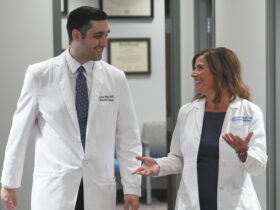By Colin E. Champ, MD, CSCS – Radiation Oncologist
 Atrophy is defined as a decrease in size or wasting away of a body part or tissue. We commonly hear about muscle atrophy, or the wasting away of muscles that we don’t exercise regularly.
Atrophy is defined as a decrease in size or wasting away of a body part or tissue. We commonly hear about muscle atrophy, or the wasting away of muscles that we don’t exercise regularly.
According to the Cleveland Clinic, muscle atrophy is the wasting away of, or thinning of muscle mass. It can be caused by disuse of our muscles or neurogenic conditions. Symptoms include a decrease in muscle mass, limb asymmetry, and numbness, weakness or tingling in the extremities. Disuse atrophy can be reversed with exercise, and specifically resistance training, and a healthy diet focusing on nutrient-dense foods. Neurogenic atrophy can sometimes be treated with a type of physical therapy called electrical stimulation.1
While the brain is not a muscle, but rather an organ, it too can atrophy. Over the last couple of decades, with the increase in use of technology, a great deal of research has shown that the way we use the internet is changing our brain—and not for the better. The available evidence indicates that the Internet can produce both acute and sustained alterations in cognition, which may be reflected in changes in the brain.2
As I have written in my online journal, “social media and phones are the processed foods for the brain. They are quick and easy and totally lacking substance and nutrition. They are sitting on the couch for three hours before bed and letting your brain turn to mush. Instead of providing nourishing and nutrient dense food, they provide hundreds of empty calories, keeping the brain bouncing around and “busy”, but never providing the stimulation that will lead to growth. They are sitting on the machine at the gym, doing a million reps at light weight, and wondering why you aren’t building muscle or getting stronger.”3
Our muscles require an intense stimulation of exercise through resistance training to force them to grow stronger, and our brain is no different. Exercising the brain to improve memory, focus, or daily functionality should be a priority in our life, especially as we get older. So, how do we exercise our brain to avoid atrophy?
People of all ages can benefit from incorporating a few simple brain exercises into their daily life. The following are a couple of simple exercises that we can do to resistance train our mind and keep it from atrophying:
1. Read and build our vocabulary.
Reading words is like doing exercise repetitions in the gym. Just as heavier weights activate more muscle fibers, reading thought-provoking books activates many regions of the brain involved in vocabulary tasks, particularly in areas that are important for visual and auditory processing. To test this theory, try this cognitive-boosting activity:
• Keep a notebook with you when you read.
• Write down one unfamiliar word, then look up the definition.
• Try to use that word five times the next day.
2. Learn or teach a new skill. Learning a new skill is not only fun and interesting, but it can also strengthen the connections in our brain. For instance, reading a book that teaches us a skill like language, pushes our brains much more than light reading.
Is there something you’ve always wanted to learn how to do? Maybe you’d like to travel but are afraid that you won’t be able to communicate effectively. You can start learning a new language and then take a trip to try it out. Perhaps you’d like to know how to repair your car. Or maybe you know how to change your oil and you could teach someone else to do it. One of the best ways to expand your learning is to teach a skill to others.
After we learn new skills, we need practice. Teaching someone else requires us to explain the concept and correct any mistakes. For example, learn to swing a golf club, then teach the steps to a friend.
References:
1. Muscle atrophy: Causes, symptoms & treatment (no date) Cleveland Clinic. Available at: https://my.clevelandclinic.org/health/diseases/22310-muscle-atrophy.
2. Firth, J. et al. (2019) The “Online Brain”: How the Internet may be changing our cognition, World psychiatry: official journal of the World Psychiatric
Association (WPA). U.S. National Library of Medicine. Available at:
https://www.ncbi.nlm.nih.gov/pmc/articles/PMC6502424/.
3. Avoiding the atrophy: Our muscles and brain are not so different (2022) Colin Champ. Available at: https://colinchamp.com/avoiding-the-atrophy-our-muscles-and-brain-are-not-so-different/ .
Inspire Exercise Medicine
Inspire Exercise Medicine is focused exclusively on supporting cancer patients on the road to regaining their health with oncologist defined evidence-based treatment plans for nutrition and exercise in support of their overall health and wellness.
A significant part of the Inspire Exercise Medicine space is dedicated to physical, monitored exercises on machines and with exercise equipment, specifically selected for treatment purposes.
Inspire Exercise Medicine
239.429.0800
InspireExerciseMedicine.com
3555 Kraft Road, Suite 130
Naples, FL 34105
Dr. Colin Champ, MD, CSCS
Dr. Colin Champ, MD, CSCS, is a radiation oncologist with board certifications in radiation oncology and integrative and holistic medicine. Dr. Champ is a certified strength and conditioning specialist, and his research interests include the prevention and treatment of cancer with lifestyle modification, including exercise and dietary modification.









